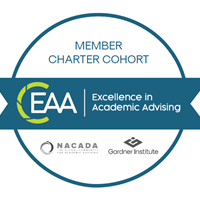Researchers who study advising suggest that you can think of academic advising as consisting of three inter-related aspects: bookkeeping, counseling, and teaching (Lowenstein, 2005).
- Advising as Bookkeeping. This perspective places the advisor’s primary job as making sure that the student has checked off all the necessary requirement to make it through to graduation. This aspect of advising constitutes the baseline—the minimum goal to be reached. In this case, the role of the advisor is primarily to provide specific information and to enforce guidelines.
- Advising as Counseling. This developmental model posits the advisor’s role as contributing to the student’s personal development, including maturity, confidence, and responsibility, not unlike the role played by a counseling center today. This view of counseling is likely familiar to many of us, as until recently it had been the dominant paradigm. This model depicts the role of the advisor as a person who engages in guided and meaningful dialogue with individual students.
- Advising as Teaching. This model suggests that we should apply the same perspectives and best practices to excellent advising as we do to teaching. Advising should engage the student in its own curriculum and do so in ways that are intentionally designed to maximize student academic outcomes. As one researcher states it, an excellent advisor does the same for an entire curriculum that the excellent teacher does for one course. (Lowenstein, 2000).
This latter model draws on the existing expertise and experience of faculty members and brings that to bear on the advising experience. Under this model, in many ways the advising experience serves a critical role in integrating the knowledge the student has gained into a meaningful, cohesive, and directed whole.
(This content has been adapted from Fostering Undergraduate Success: A Guide for Faculty Advisors, WCU Advising Center.)









